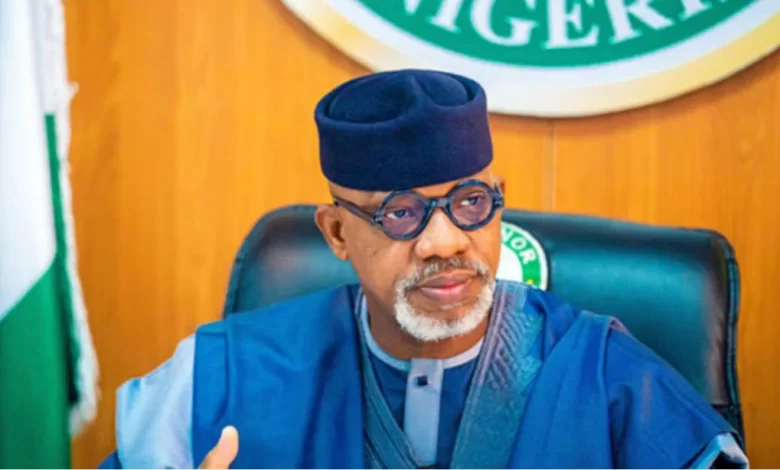Abiodun: When Actions Are Above Words

By Kunle Somorin
Ogun State governor, Dapo Abiodun, last week demonstrably showed his commitment to prioritizing action over words in governance. By celebrating his 64th birthday and the first year of his second term in office by sharing the dividends of democracy, he has shown that he is focused on tangible results and impactful decisions over and above his people’s penchant for owambe. This approach is a hallmark of effective leadership, emphasizing the importance of concrete actions over mere rhetoric and empty promises.
In governance, action should speak louder than words. While dialogue and communication are crucial elements of leadership, service above words, actions, and policies implemented by government officials are truly the essence of democracy. Adopting these principles dictates the need for leaders to move beyond mere lip service and actively work towards achieving positive outcomes for their constituents. This requires a proactive and results-driven approach to addressing pressing issues, enacting necessary reforms, and fostering sustainable development.
Governor Abiodun’s quiet diplomacy with Abuja has also yielded results, as evident in the federal government’s commitment to exploring oil production in Ogun State. The Minister of State for Petroleum Resources, Heineken Lokpobiri, and other stakeholders in the oil industry have acknowledged the state’s potential for discoveries. This development is a testament to the governor’s proactive approach to addressing the state’s economic needs.
Understanding the need to speak less means more with hindsight within the constellation of challenges for a politically sophisticated nature of the state. There have been more hues and cries over infrastructural development and the roads in a state of disrepair would make the lilly-livered to throw in the towel after an intriguingly explosive first term. But DA’s posture on the development of road and rural infrastructure is achieving inclusive and sustainable growth, empowering communities, fostering economic development, and paving the way for a more equitable society. Nigerians would have less reason to groan and insult the political class that is fast losing its honour and relevance. As the world moves towards achieving the Sustainable Development Goals, the focus on rural infrastructure will remain a key priority, with the potential to transform the lives of millions living in the rural communities.
The principle of action above words serves as a reminder of the responsibilities and accountabilities of those in positions of authority. While political speeches and promises can generate enthusiasm and hope, it is the concrete steps taken by leaders to uphold the rule of law, promote social justice, and foster economic growth that truly reflects their dedication to the well-being of society. By translating words into action, government. Furthermore, action above words in governance encourages transparency, accountability, and ethical behaviour from public officials. By prioritizing tangible results and transformative policies, leaders can ensure that their actions are aligned with the needs and aspirations of the people they represent. Moreover, a commitment to action over rhetoric also necessitates the efficient utilization of resources, the prudent management of public funds, and the avoidance of empty gestures that serve as mere political posturing.
The governor’s decision to commission roads across four local government areas and two senatorial districts, without fanfare, is a demonstration of his commitment to delivering the dividends of democracy. The commissioning of newly constructed roads, particularly in rural communities, sets him apart from his peers. His focus on rural road infrastructure is a deliberate attempt to ensure inclusiveness and address long-standing challenges in these areas.
The commissioning of the Sagamu-Iperu-Ode-Sapade road has opened up the Remoland to Lagos, Ibadan, and the rest of the country, reducing travel time and improving connectivity. The approval of new road projects in six councils, including Ijebu East, Ogun Waterside, Yewa South, Ikenne, Ijebu North, and Odogbolu, is a testament to the governor’s resolve to ensure all-inclusive transformation and infrastructure development across the state.
Governor Abiodun’s commitment to infrastructure development is evident in his efforts to address the infrastructural deficit in Ogun State. His focus on road infrastructure is a key economic enabler that attracts investors to the state. The commissioning of the Ilaro-Iwoye-Owode Road, which had been in a deplorable condition since 1991, is a significant development for the Yewa people. The reconstruction of the 63km Ado-Odo/Abeokuta expressway – I guess the governor is talking about death-trap called Sango-Ota (the industrial nerve centre of the country) to Abeokuta the state capital – which is the second busiest road in the country, will also have a positive impact on the economy of Ogun West, Ogun Central, and the entire nation. Ota is the industrial nerve centre of the country
The governor’s focus on rural road infrastructure is a deliberate attempt to ensure inclusiveness and address long-standing challenges in these areas. As he commissioned the Ilaro-Iwoye-Owode Road, he stated, “This road was chosen as part of the celebration to mark the five years of our administration… Our focus on infrastructure is due to it being a key economic enabler that attracts investors to the State.”
To this, an excited Olu of Ilaro and paramount ruler of Yewa, Oba Kehinde Olugbenle sang a new song. The first class monarch who last year lamented that the people of the area had not felt the impact of the government in the last 10 years, had said: “I was not always happy with the last government whenever I was invited to other places to come and inaugurate projects. While here, it is only turning of the sod for eight years. I will go and dance with them in other places, while nobody has come here to dance with me to inaugurate a project.” But, today, Oba Olugbenle, lauded the Dapo Abiodun administration for listening to the yearnings of the Yewa people as the people rejoiced at the inauguration of the road project which attracted the crème-de-la-crème of the political and business classes, including, former Governor Olusegun Osoba and the chairman Senate Committee on Appropriation, Senator Adeola Olamilekan.
By prioritizing action over empty rhetoric, Governor Abiodun has demonstrated his commitment to delivering the dividends of democracy to the people of Ogun State. As he stated, “We have just awarded the Ado-Odo/Abeokuta road… It will be the most expensive road this administration has reconstructed.” This approach is a testament to his resolve to ensure all-inclusive transformation and infrastructure development across the state.
The governor’s approach to governance is a reminder that action speaks louder than words. By prioritizing tangible results and transformative policies, leaders can ensure that their actions are aligned with the needs and aspirations of the people they represent. The principle of action above words serves as a reminder of the responsibilities and accountabilities of those in positions of authority.
Gov Abiodun has prioritized agriculture, recognizing its potential for economic growth and job creation. He launched the Ogun State Agricultural Development Strategy (OGADS) aimed at modernizing farming practices, improving productivity, and enhancing farmers’ livelihoods. The strategy includes initiatives like mechanized farming, irrigation systems, and access to credit facilities. These efforts have attracted investors, created jobs, and increased food production, making Ogun State a model for agricultural development in Nigeria. Indeed the anchor borrowers’ scheme has produced more than 40,000 agriprenuers. The youths are also bubbling and when the state holds the National Sports festival later this year, more talents would be unveiled.
The governor has addressed the housing deficit in Ogun State by launching the “Building Our Future Together” initiative, with over 4,000 houses delivered across disparate social classes. This programme aims to provide affordable housing units for residents, particularly low-income earners. The initiative includes partnerships with private developers, provision of infrastructure, and creation of a mortgage finance system. As a result, many families have accessed decent housing, improving their quality of life and stimulating economic growth. The avant-garde agro cargo airport is also a beneficiary of the middle-income earners with yellow roofs, dubbed Prince Court estates.
Gov Abiodun has demonstrated a commitment to education, recognizing its role in human capital development. He has implemented various reforms, including the establishment of the Ogun State Education Development Fund to improve infrastructure, teacher training and recruitment, and student welfare. More than 25 years after students in tertiary institutions now earn busaries and indigent pupils also got some palliatives. The governor was the first to introduce digital learning platforms, expanded access to vocational education, and promoted literacy programmes. These initiatives have enhanced the quality of education in Ogun State, preparing students for a competitive future.
The governor has transformed the civil bureaucracy in Ogun State by introducing reforms aimed at promoting efficiency, transparency, and accountability. He has digitized government processes, reducing bureaucracy and enhancing public service delivery. The governor has also implemented a performance management system, recognizing and rewarding outstanding public servants. These reforms have improved the overall effectiveness of the civil service, making it more responsive to the needs of citizens. Indeed on Friday, five deserving bureaucrats were made permanent secretaries without “knowing the governor or people who know people that know the governor” which was the practice in the days of yore.
Warts and all, Governor Abiodun’s commitment to action above words is a fundamental principle that underscores the critical importance of tangible results, proactive decision-making, and meaningful change in the realm of leadership and public administration. By prioritizing action over empty rhetoric, governments can chart a course towards a more just, equitable, and prosperous society, where the well-being and interests of the people take precedence over mere political grandstanding.
• Somorin, a doctoral fellow at Crescent University, writes from Abeokuta




